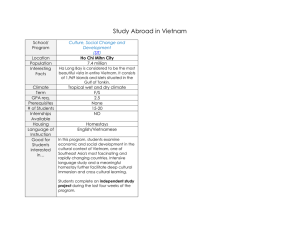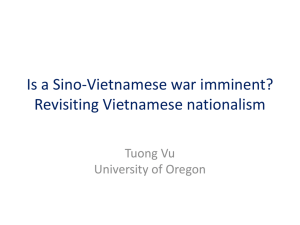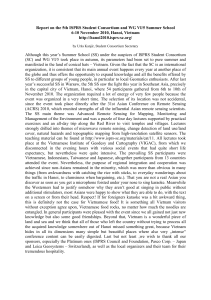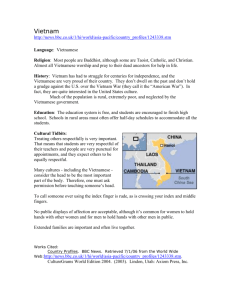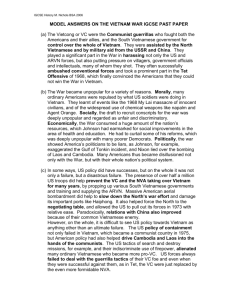“Crossing the Street with Blinders On”: A Visit to Contemporary Vietnam
advertisement
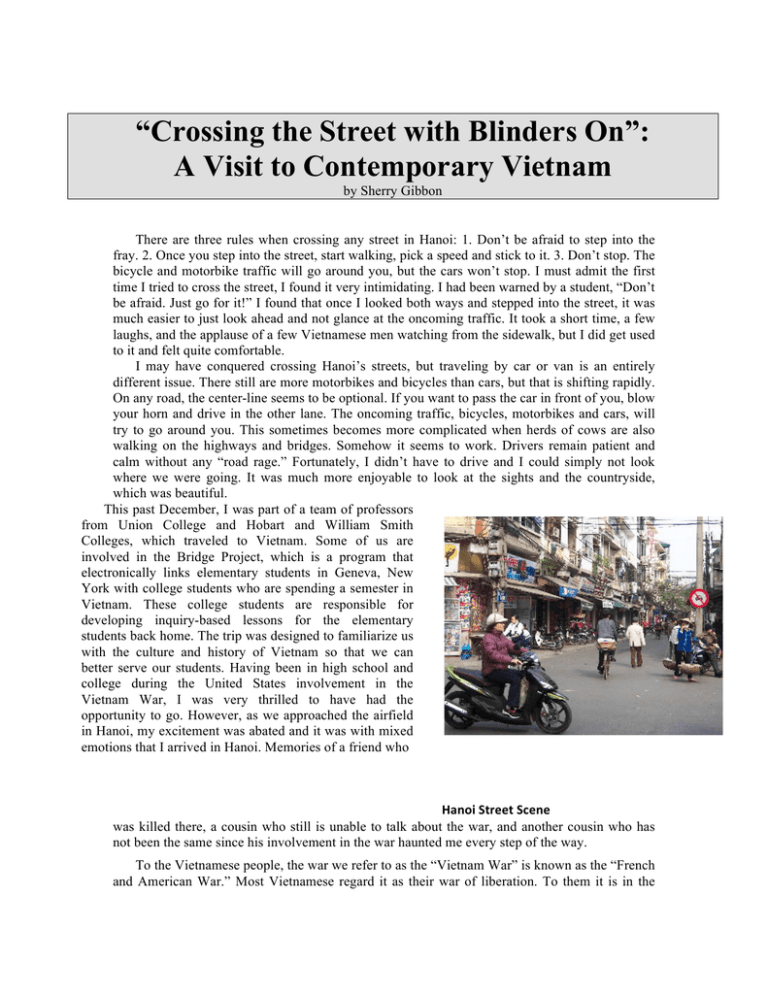
“Crossing the Street with Blinders On”: A Visit to Contemporary Vietnam by Sherry Gibbon There are three rules when crossing any street in Hanoi: 1. Don’t be afraid to step into the fray. 2. Once you step into the street, start walking, pick a speed and stick to it. 3. Don’t stop. The bicycle and motorbike traffic will go around you, but the cars won’t stop. I must admit the first time I tried to cross the street, I found it very intimidating. I had been warned by a student, “Don’t be afraid. Just go for it!” I found that once I looked both ways and stepped into the street, it was much easier to just look ahead and not glance at the oncoming traffic. It took a short time, a few laughs, and the applause of a few Vietnamese men watching from the sidewalk, but I did get used to it and felt quite comfortable. I may have conquered crossing Hanoi’s streets, but traveling by car or van is an entirely different issue. There still are more motorbikes and bicycles than cars, but that is shifting rapidly. On any road, the center-line seems to be optional. If you want to pass the car in front of you, blow your horn and drive in the other lane. The oncoming traffic, bicycles, motorbikes and cars, will try to go around you. This sometimes becomes more complicated when herds of cows are also walking on the highways and bridges. Somehow it seems to work. Drivers remain patient and calm without any “road rage.” Fortunately, I didn’t have to drive and I could simply not look where we were going. It was much more enjoyable to look at the sights and the countryside, which was beautiful. This past December, I was part of a team of professors from Union College and Hobart and William Smith Colleges, which traveled to Vietnam. Some of us are involved in the Bridge Project, which is a program that electronically links elementary students in Geneva, New York with college students who are spending a semester in Vietnam. These college students are responsible for developing inquiry-based lessons for the elementary students back home. The trip was designed to familiarize us with the culture and history of Vietnam so that we can better serve our students. Having been in high school and college during the United States involvement in the Vietnam War, I was very thrilled to have had the opportunity to go. However, as we approached the airfield in Hanoi, my excitement was abated and it was with mixed emotions that I arrived in Hanoi. Memories of a friend who ! "#$%&!'()**(!'+*$*! was killed there, a cousin who still is unable to talk about the war, and another cousin who has not been the same since his involvement in the war haunted me every step of the way. To the Vietnamese people, the war we refer to as the “Vietnam War” is known as the “French and American War.” Most Vietnamese regard it as their war of liberation. To them it is in the past. There are some vestiges of the war that remain, but the Vietnamese do not focus upon them. The attitude of the people is to forget the past and look to the future. If they speak of the war at all, it is in passing or as an afterthought. They are too busy tending to their families, working, and making money. The country is united and progress is being made. To many Americans, especially of my generation, the war has left many scars and is far from over. The price paid was too high: lives were lost as was our faith and trust in our leaders. This is not so for most Vietnamese. They seem willing to accept the continued corruption in their government and are focused on a future which looks bright. Hanoi was a wonderful city, full of life and energy. There were many surprises in store. I was most astonished by seeing “Merry Christmas and Happy New Year” signs on so many large and small shops. The country is over 80% Buddhist, but the people have embraced the Christmas holiday. The Vietnamese love to celebrate, and Christmas is no exception. The holiday is spent with family and without the materialism so often found in the West. I tasted the best ice cream there, and became “hooked” on coffee sua (Vietnamese coffee with sweetened condensed milk— don’t grimace until you have tasted it). The city was our base, and we ventured from there to the craft villages (silk, block printing and pottery). We visited many temples, spent a beautiful day on Halong Bay, flew to Hue, dined on the Perfume River, drove over the mountains to Da Nang, and ended in Hoi An. Vietnam may be a Communist country, but capitalism is alive and well. After years of sanctions, poor economic planning and decision making, the government appears to be staying out of the way of free enterprise. Everywhere we traveled there were street vendors selling souvenirs, water, trinkets, “Tiger Balm” (a claimed cure-all for almost everything) and just about anything else a tourist might want. One common ploy I heard more than once was, “You buy from me--I will remember you forever.” They seemed to know just what to say to appeal to one’s generosity, and I must admit that it usually worked. The Vietnamese economy is growing rapidly and people are busy working and making money. We were invited by a good friend of three of the professors to have dinner with his family. Both of his sons were there, along with their wives and children. His sons were doing very well; one was working at a restaurant as a chef and the other had just opened a second motorbike shop. The latter owned a car and travels frequently to Japan and Europe on business. The Vietnamese people are amazing. They are hard working and very friendly. It is said that Vietnamese women work very hard and Vietnamese men “network.” Our students who were in Vietnam say that this is very true. Women do all kinds of work: in the rice paddies, in silk making and dressmaking, selling in the markets and running businesses. We took a cooking class from the chef owner of the Cargo Club, a wonderful restaurant in Hoi An. We learned that the secret to Vietnamese cooking is balancing yin and yang. One should not be able to taste any single ingredient. '(,-*$(.!/$0%1!2*+*..! What made this experience unusual was that the chef owner was a woman. She told us of her poverty growing up, and how she had to wear her parents’ old clothes to school. Now she is the successful owner of two restaurants and is opening a hotel. She has a daughter and is able to buy her many nice things, but her daughter complains all the time and is not happy. As she shared this with us, she radiated sadness. It seems the Vietnamese, too, are learning that material things don’t necessarily bring happiness. In his book The World Is Flat, Thomas L. Friedman writes of the changing nature of global economics and the emergence of a strong middle class in China and India. This change will have a tremendous impact on Vietnam as well. Last week Intel announced it was opening a new plant north of Ho Chi Minh City. Globalization is having its effect and before long it will be modernized and will seem less foreign to westerners. Vietnam has already become one of the most popular tourist attractions in Asia. Along with foreigners comes their money. The blessings of prosperity will improve the standard of living for most people. However, with this increased prosperity comes the down side. Soon Vietnam will face traffic jams with cars and not bicycles, motor bikes and siclos (pedicabs). Hanoi has already begun installing more traffic lights. Starbucks and McDonalds can’t be far behind. There is an excitement in Vietnam that you can feel. And yet, while I was there, I felt a sense of sadness. With economic growth and prosperity, something beautiful about their culture may be gone forever. I hope it is able to hold on to its innocence despite the growing materialism. Vietnam needs to be experienced before it changes too much. The United States may have fought a war with armies and weapons, but in looking at what is happening in Vietnam, it is hard to tell that we lost that war. History has shown that it is easier to conquer a nation economically than by force of arms. Some lessons we never seem to learn.
![vietnam[1].](http://s2.studylib.net/store/data/005329784_1-42b2e9fc4f7c73463c31fd4de82c4fa3-300x300.png)

